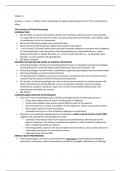Summary
Summary of Clinical Psychology (PSY 335; Chapters 1-7, 12 and 13)
- Course
- PSY 335
- Institution
- Ryerson University (Ru )
This document contains a comprehensive set of detailed notes taken from the textbook for PSY 335 (Clinical Psychology; Chapters 1-7, 12, 13). The notes summarize key concepts, theories, and findings discussed in the chapters required for the course, providing a structured and accessible resource fo...
[Show more]



